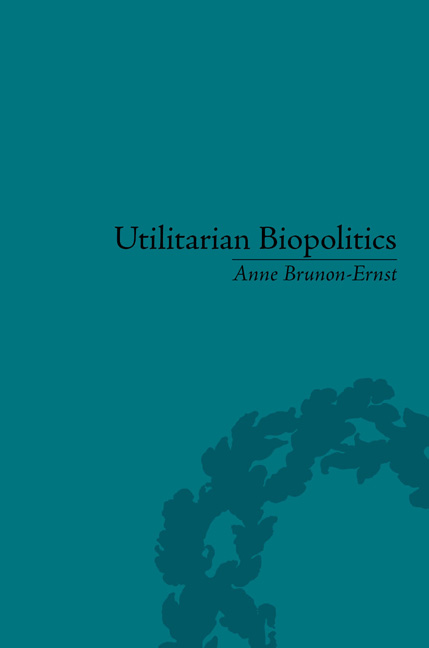Book contents
- Frontmatter
- CONTENTS
- Acknowledgements
- General Introduction
- Part I Biopolitics of Interests Introduction: From Interest to Norms
- Part II Utilitarian Conduct of Conduct Introduction: Legal Norms, Extra-Legal Norms and Utilitarian Conduct
- Part III The Biopolitical Expert Introduction: The Moralist and the Economist
- Epilogue: (De)Constructing Biopolitics
- Notes
- Works Cited
- Index
Epilogue: (De)Constructing Biopolitics
- Frontmatter
- CONTENTS
- Acknowledgements
- General Introduction
- Part I Biopolitics of Interests Introduction: From Interest to Norms
- Part II Utilitarian Conduct of Conduct Introduction: Legal Norms, Extra-Legal Norms and Utilitarian Conduct
- Part III The Biopolitical Expert Introduction: The Moralist and the Economist
- Epilogue: (De)Constructing Biopolitics
- Notes
- Works Cited
- Index
Summary
Words without ideas, phantoms without substance, have hitherto composed, and for a long time will continue to compose, the discourse of the bulk of arguing on politics and morals.
First is the wish to neutralize, and as it were polish, scientific language to the point at which, stripped of all its singularity, purified of all its accidents and alien elements … it could become the exact reflection, the perfect double, the unmisted mirror of a non-verbal knowledge. This is the positivist dream of a language keeping strictly to the level of what is known: a table-language.
From Norm to Language
Norms run through the argument of this volume. The utility principle is normative, as are Foucault's pleasures and pains, notwithstanding his refusal to norm them. What Bentham teaches us about Foucault's pleasures is that they cannot operate if they do not abide by a minimal norm, which is utilitarian in essence. Conversely, what Foucault teaches us about Bentham's pain is that utility cannot be construed as a monolithic norm. Instinct appears as the underside of motives for acts which do not comply with utility. Part I has shown how norms in Bentham and Foucault are not a scheme for assessing compliance or noncompliance to the norm; the opposition is not binary. Norms in Bentham and Foucault operate in a continuum between minimum compliance to the norm and maximum compliance. In utilitarian and biopolitical contexts, the norm is the utilitarian calculus of a cost/benefit assessment.
- Type
- Chapter
- Information
- Utilitarian BiopoliticsBentham, Foucault and Modern Power, pp. 125 - 134Publisher: Pickering & ChattoFirst published in: 2014



